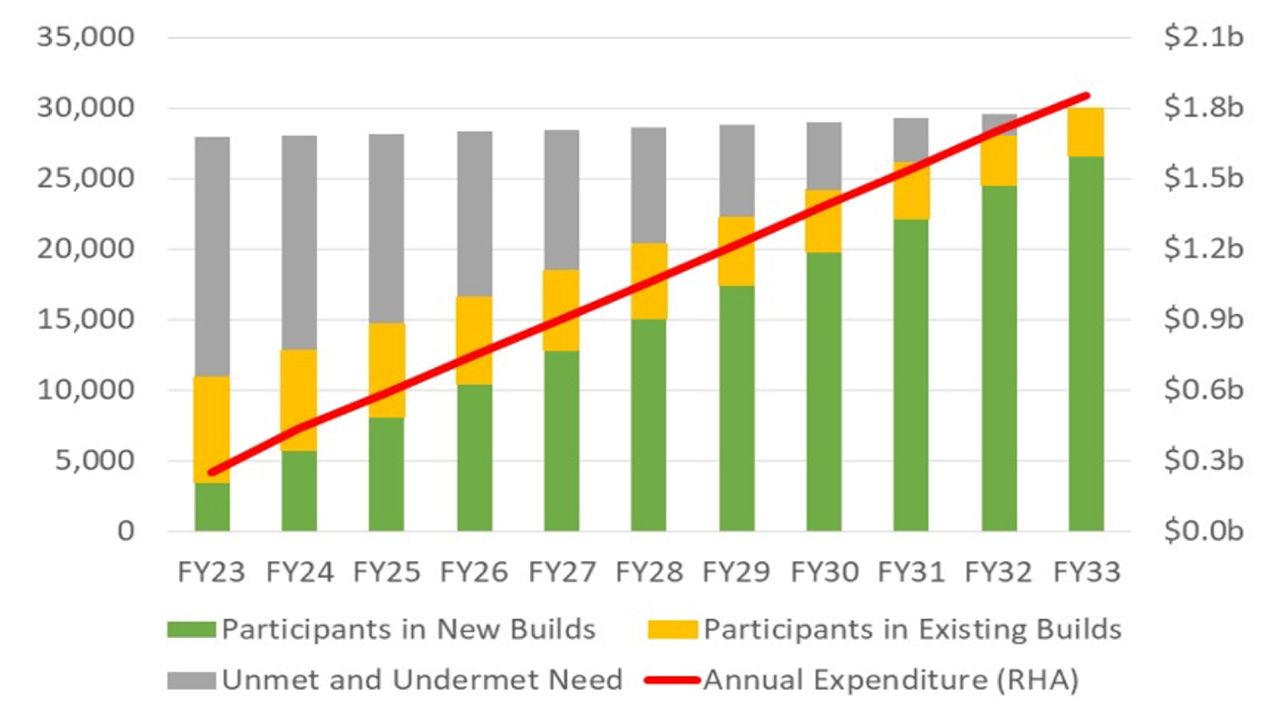SDA Price Review: SDA Pricing Arrangements for 2023-24 and how they may impact the SDA market
Jun 26
/
Vivien Williams

SDA Price Review: On 16 June the NDIA released the Specialist Disability Accommodation (SDA) Pricing Review for 2022-23. The review was undertaken to evaluate the impact of current SDA prices on supply and demand of SDA housing and to set new SDA prices. The new SDA prices will guide market investment in areas that will benefit people with disability over the next 5 years.
This blog looks at the key outcomes and the impact for NDIS participants, the SDA market and SDA providers.
Background
The recommended changes to SDA prices have been made to reflect the real costs and demand for SDA. Over the longer term this should incentivise the construction of new dwellings more in line with demand and mean more participants are able to access the SDA housing they need.
What’s happening now
The annual base prices for many SDA building types and design categories will increase. The most notable differences are the increase in price for Robust, Improved Liveability and 2 and 3-resident House categories. The annual base prices that will stay the same or decrease are those in the High Physical Support design category.
The review states that the cost of tenancy management and the maintenance of SDA properties is 50% higher than what is allocated in the current pricing arrangements. The NDIA is proposing to increase the costs to better reflect the true costs of SDA, which will help overcome barriers to developing SDA dwellings in line with demand.
It is expected the changes in pricing will see SDA supply change in future. The new prices offer an incentive for SDA providers to consider different design categories and building types as prices are now reflective of actual costs. Previously there was a greater incentive to build High Physical Support as it was the highest funded category, which suggests more return on investment.
A recent SDA supply report released by the Housing Hub (SDA Supply Report Oct 2022) found that most SDA properties in the pipeline were High Physical Support (64.2%) design, followed by Robust (12.8%), Improved Liveability (12.2%) and Fully Accessible (10.5%). Some SDA providers already offer High Physical Support dwellings to participants that are eligible for other design categories, however not all SDA providers do this. The increase in pricing should encourage more SDA providers to accept participants with funding for other design categories. This is a great outcome for participants as it means they can age in place and not have to move should they ever need the design features of a High Physical Support dwelling.
As shown in the chart below, there is currently a high unmet or undermet need in the SDA market. If these changes have their intended impact, this undermet need will decrease as the market better reflects participant demand.

Table 1: NDIS, SDA Pricing Review 2022-2023, June 2023, page 46
The review states that if SDA prices are not increased as recommended, in 10 years approximately 20,131 participants will not be able to access the SDA they need. This would put pressure on other systems such as health, housing and aged care.
The review recognises that SDA should be used to support participants that are stuck in hospital or in aged care to move into more appropriate housing. This supports the NDIA’s current focus on getting participants home from hospital as well as the government’s goal to ensure no younger person is living in aged care by 2025.
The review stated that “SDA should be considered as an investment in Scheme sustainability rather than only as an expenditure by the Scheme”. In time there will be a growth in savings as a result of the decrease in paid support therefore lowering the costs of the scheme.
What this means for you
Participants
For participants there are no immediate changes to an NDIS plan that includes SDA funding. The NDIA will adjust the amount of funding included in participant plans to ensure all participants continue to have access to SDA funding.
The new SDA benchmark price changes will take effect from 1 July 2023, and will be fully operational by 1 October 2023. This will ensure those involved in the SDA journey have time to learn how the agency will implement the changes. However it may be turbulent times for those involved in the SDA journey as we have previously seen disruption as change is implemented.
Support coordinators
Support coordinators can prepare for SDA funding amounts in NDIS plans to reflect the NDIS SDA Pricing arrangements 22-23. Support coordinators must be aware of annual base prices in the NDIS SDA Pricing arrangements to ensure funding changes are in line with participants’ current SDA arrangements or home and living goals.
A support coordinator or family supporting someone on their SDA housing search may want to re-engage with SDA providers to see if this will change outcomes for participants.
It is a good time to review the needs and preferences of participants living in group homes. It has been recommended that the NDIA look at phasing out the ability of new 4-5 bedroom homes to be enrolled as SDA. Careful consideration should be given to the SDA Rules 2020 to ensure SDA funding is appropriate to meet the needs and preferences of participants. Consideration should go beyond SDA eligibility and also focus on building type, occupancy and location (Section 16,16,18 of SDA rules 2020).
SDA providers
Further information for SDA providers about how to claim the new SDA prices will be made available from 1 July 2023. The best thing to do is to stay up-to-date via the NDIA website.
In conclusion
The future of the SDA market is heavily dependent on how the recommendations are actioned by the NDIA and all levels of government in the coming months. There is a need to ensure the SDA market is thriving, self-sustaining and meeting the goals of government, participants, providers and investors.
For participants who have successfully moved into SDA that both meets their disability needs and supports their choice to live independently in their own home, research shows significant benefits across quality of life, community integration and health. As a participant gains independence, the need for other kinds of support can be scaled back over time.
Further, living in appropriate housing gives the participant choice and control in their life and is a human right under Article 19 and Article 28 of the United Nations Convention on the Rights of Persons with Disabilities. SDA is underpinned by a service approach that focuses on an individual's needs and champions their legal rights, as tenants and consumers, to live on their own terms with safety, dignity and real independence.
What you can do now
UpSkill has public workshops on:
- Supporting young people in residential aged care to benefit from the NDIS
- NDIS eligibility and pre-planning in the hospital setting
- Supporting NDIS participants to leave hospital
- Applying for SDA: Eligibility and positive outcomes
If you are supporting someone in aged care:
Contact the Housing Hub’s Residential Aged Care (RAC) Services Coordination
0456 770 781 | sinead.mckee@housinghub.org.au
Contact the Housing Hub’s Residential Aged Care (RAC) Services Coordination
0456 770 781 | sinead.mckee@housinghub.org.au
If you are supporting someone stuck in hospital:
Contact the Summer Foundation’s Hospital to Home Service
1300 817 794 | hospitaltohome@summerfoundation.org.au
The Pricing Review (22-23 SDA Price review) was conducted in consultation with a number of stakeholders and experts. Ernst & Young undertook independent technical research and analysis to support the review. Additionally, the review convened a panel of 6 independent experts and conducted a broader consultation with participants, providers, peak bodies, SDA investors and others. In total there were 46 sector submissions received and over 100 organisations and individuals consulted during the review process. Information on the consultation paper can be found here.
Empty space, drag to resize
Who we are
Training provided through the Housing Hub (formerly UpSkill) equips you with the confidence and skills needed to effectively support people with disability to live well in the community.
Join our mailing list
Thank you!

